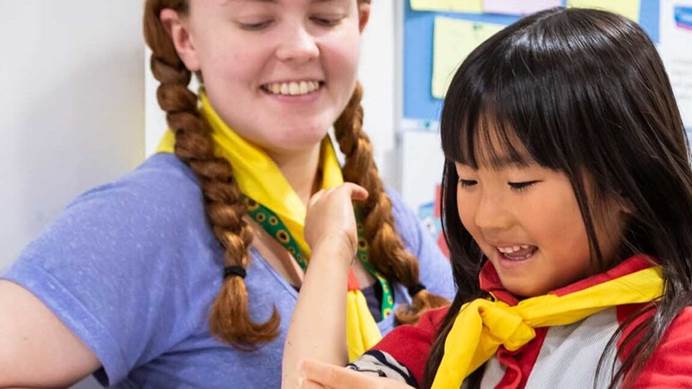Social inclusion
Practical advice for overcoming social and economic barriers that prevent girls from joining guiding
Girlguiding's members have a range of backgrounds and experiences - it's part of what makes our charity great.
As a charity for all girls we strive to make sure that every girl and young woman is given equal access to the opportunities that we offer. This can mean that we need to take a more bespoke approach on a case by case basis. So we invite all our leaders, or volunteers, who require support or advice on including any young members to use the resources and guidance available.
If you can’t find what you need, or you want to talk things through with someone to make sure you are meeting the requirements of our equality and diversity policy, get in touch with your local commissioner or with the national info team for bespoke help and advice.
Follow the simple steps below and on other pages in this section to support girls from all socio-economic backgrounds to get the most out of guiding.
On this page:
Children in care
We can provide a great setting for girls in the care system to find their place in the community.
Children in care, also known as looked-after children, are children that have become the responsibility of a local authority. This may be voluntarily, through a parent, or because the child is considered to be at risk.
Regular guiding meetings give girls going through the care system something familiar and safe to take part in. Through guiding, they can build trusting relationships and friendships, learn important life skills, challenge themselves, build their self-esteem and develop their potential.
These things are especially important for girls and young women who are going through the care system, when other aspects of their lives will often be unstable. Guiding gives them space to learn more about themselves and to grow into confident, self-sufficient individuals.
Our programme and method are fantastic at building important life skills for independent living - such as budgeting - that a young person in care may not have developed elsewhere.
Once a young person leaves the care system, guiding can be a vital source of continued support and information to them. Providing a sense of community, leadership skills and opportunities.
Be flexible
Some girls may find it difficult to attend a unit every week so be flexible with how badges and other parts of the programme are completed.
Consider financial support
The costs of uniform, trips and subs may be paid through social services, the girl’s foster carer or social worker. Try to be sensitive and patient if they need additional time to pay. If money is a problem, speak to your commissioner about ways you could support the young person. See our guidance for supporting members with the cost of living for more information.
Don't make assumptions
Don't jump to conclusions about a girl’s background as every case is different. A girl may wish to talk to you about her background or she may wish to keep that private. This is her decision.
Prepare for sudden changes
Girls in the care system may move suddenly. Be prepared to talk to girls in your unit about this if they ask about what has happened. To protect the child, don’t disclose any personal details about the girl or where she has moved to. This includes speaking to other leaders, parents or girls in the unit. There are guiding units all over the UK so even if a girl has to move she may be able to join a unit in her new area. Find out how to help girls transfer to different units.
Be sensitive around celebration days
These may be difficult for a child in care. Consider how this might affect activities that you are planning, for example, making cards or gifts for parents.
Remember that consent forms can be signed by the person with parental responsibility for the child.
A child who's in care may wish to talk to you as an adult that they trust and have regular contact with. They may also choose to speak with any young leaders in your unit, so make sure that you’re available to support young leaders too.
This is an important responsibility, so if a girl turns to you for advice or support, make time to listen. If you're in the middle of a group activity, tell her that you’ll carry on your conversation after the activity has ended. Make sure that you follow through with this and are consistent. Be honest and do your best to answer any questions that a girl might have - as long as it's appropriate for you to do so.
See our full guidance on safeguarding and risk.
If you're finding it difficult to support a girl in care, talk to the other leaders in your unit or ask for support from your commissioner. You might find that other leaders have experienced similar things and can give you guidance. However, it's important that you preserve the confidentiality of the child when discussing anything about them.
You can also contact the girl’s foster parents, social worker or family support worker for guidance. However, if you have any safeguarding concerns, please make sure you follow Girlguiding's safeguarding policy.
Become provide a voice for young people in care, and offer further support for local authorities, education professionals and foster carers.
Members with family in prison
Having a family member in prison may affect a child’s behaviour, mood or access to resources.
If a member has family in prison, they may be going through a very difficult time of uncertainty and change.
Guiding can give them a space where they can be themselves, away from any external family circumstances. It gives them the opportunity to build skills, friendships and develop networks of support.
Whatever the conditions surrounding the imprisonment, it's important to remember that this isn't a reflection on the child in your unit. They may not know that their family member is in prison. They may also not be aware of the circumstances that led to the imprisonment, and certainly won't have been able to influence their situation at home.
If you find out that a family member of a young member is in prison, you must not pass on this information without the family’s permission.
Remember, if you hear about a child’s family member being sent to prison through another person or news coverage, be careful not to make assumptions or jump to conclusions. This could affect how the child is treated in guiding.
Including members with family in prison
Manage challenging behaviour
A child who has a close family member in prison may be experiencing a number of conflicting emotions. They may be struggling to understand that a person they love could do something bad. This may lead to challenging behaviour within unit meetings. Our guiding conversation has more information on challenging behaviour in unit meetings.
Be sensitive around celebration days
These may be difficult for a child who has a close family member in prison. Consider how this might affect activities that you’re planning for example, making Fathers’ Day cards or Christmas gifts for parents.
Learn how to respond to her needs
As a leader you may notice changes in a young member's behaviour or she may become withdrawn. MindEd - a free educational resource on children and young people's mental health - has a pathway for Girlguiding that will help you respond to young members' individual needs.
Be flexible
A child or young person may have difficulties attending regular meetings due to factors outside of their control. They may also have caring commitments. See our guidance on including carers for information on how to make guiding more accessible.
Support those in care
If a child has a parent in prison, they may be taken into care or have to move home. See our guidance on supporting children in care for more information.
Financial support
A child or young person with a close family member in prison may have difficulty paying for subscriptions, uniform or event tickets, so follow our guidance on supporting members with the cost of living.
A child with a family member in prison may wish to talk to you as an adult that they trust and have regular contact with. They may also choose to speak with any young leaders in your unit, so make sure that you’re available to support young leaders too.
This is an important responsibility, so if a girl turns to you for advice or support, make time to listen. If you’re in the middle of a group activity, tell her that you’ll carry on your conversation after the activity has ended. Make sure that you follow through with this and are consistent. Be honest and do your best to answer any questions that a girl might have - as long as it's appropriate for you to do so.
See our full guidance on safeguarding members.
- Barnardo’s- this children's charity has information and guidance on supporting children affected by parental imprisonment.
- Action for Prisoners’ Families- promotes the just treatment of prisoners’ families by the prison system and society across the UK.
Young mothers
The term 'young mother' is typically used to describe a young mum under the age of 19.
Young mothers may feel isolated from their peer group and community due to the unique pressures they face. They also may be under financial pressure and unable to make regular commitments to meetings.
How can guiding help?
Girlguiding offers young mothers the opportunity to develop skills and gain qualifications outside of a formal educational environment. Guiding is also a great way for them to maintain friendships with members of their peer group, and build a support network in their local community.
Plan ahead
Plan your programme ahead of time and share it with the young mother as early as possible. If childcare is limited, this will help her to plan her time and prioritise which meetings to attend.
Inclusion at residentials
Residential opportunities may not be possible due to cost and time commitment. Try to organise events that can be accessed easily on the same day by public transport, so that young parents can balance attending the event with childcare commitments.
Financial support
Young mothers may struggle with guiding costs, so follow our guidance on supporting members with the cost of living.
Encourage them to stay involved
If a young member is unable to make a weekly commitment to guiding, consider other ways for her to get involved. Make sure she receives regular updates on meetings and events. Even if she decides to leave, she may still want to stay in contact and access the support that Girlguiding can offer. Regular contact will also make re-joining a unit easier.
Be understanding about childcare
Although it's not recommended that young mothers bring their children to meetings, there may be times when childcare isn’t available. Children attending with young mothers should follow the adult to child ratios for children of volunteers.
A young mother may wish to talk to you as an adult that they trust and have regular contact with. They may also choose to speak with any young leaders in your unit, so make sure that you’re available to support young leaders too.
This is an important responsibility, so if a girl turns to you for advice or support, make time to listen. If you’re in the middle of a group activity, tell her that you’ll carry on your conversation after the activity has ended. Make sure that you follow through with this and are consistent. Be honest and do your best to answer any questions that a girl might have - as long as it's appropriate for you to do so.
See our full guidance on safeguarding members.



